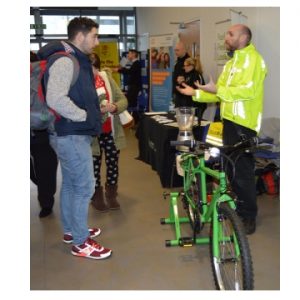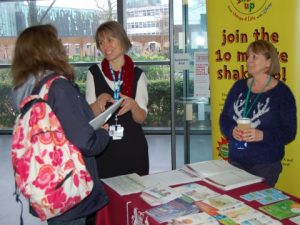Lifelab
One of our flagship projects is Lifelab. LifeLab project
LifeLab projectenGasia resources

Try out some of HTML5 geometry proof pages made for the British Academy enGasia project.
Health and wellbeing conference 2016
The Health & Wellbeing Conference for trainee teachers and teachers/lecturers, at Southampton Education School
Friday 9th December 2016, 8.45 – 15.45
If you would like to attend any part of the day please fill in this form.
We warmly invite educational personal from the University of Southampton as well as from schools in the region to our yearly Health and Wellbeing Conference, which is part of the Health and Wellbeing Programme for our trainee teachers. It is a multi-disciplinary event involving staff from Southampton Education School and a wide range of statutory (e.g. Public Health England; Local Authority Public Health bodies), non-statutory and charitable health organisations attending to give Keynote talks, facilitate Workshops, and/or contribute to the interactive Exhibition. The Health and Wellbeing Conference can also be used as CPD for qualified teachers and lecturers.
 The Health and Wellbeing Conference aims to increase teachers’ knowledge, skills and confidence to teach the about and deal with their own and their pupils’ health and wellbeing. It is one element of a programme of health and wellbeing training that was developed by a multi-disciplinary team of experts including The School of Education and The Faculty of Medicine, as well as external agencies to address a need identified in Southampton’s initial teacher training courses as well as nationally through research carried out at Southampton (Byrne et al, 2015). The programme aims to raise awareness of the importance of health and wellbeing/PSHE education, its connection to good educational outcomes and the key role teachers can play in promoting healthy lifestyles.
The Health and Wellbeing Conference aims to increase teachers’ knowledge, skills and confidence to teach the about and deal with their own and their pupils’ health and wellbeing. It is one element of a programme of health and wellbeing training that was developed by a multi-disciplinary team of experts including The School of Education and The Faculty of Medicine, as well as external agencies to address a need identified in Southampton’s initial teacher training courses as well as nationally through research carried out at Southampton (Byrne et al, 2015). The programme aims to raise awareness of the importance of health and wellbeing/PSHE education, its connection to good educational outcomes and the key role teachers can play in promoting healthy lifestyles.
Evidence (e.g. Brooks, 2014) indicates that there is a positive relationship between good educational and health outcomes, therefore the wider community (schools and their pupils) also benefit from teachers trained in health and wellbeing during their training year, and subsequently post qualification. The Health and Wellbeing Conference aspect of Southampton’s ITE programmes is unique and places Southampton trainee teachers at a distinct advantage with respect to their future careers. Furthermore, Ofsted’s focus on pupil wellbeing and the Government’s concern for young peoples’ mental health means that our programme at Southampton is at the forefront of Initial Teacher Training courses.
If you would like to attend any part of the day please fill in this form.
 The programme of the day is as follows:
The programme of the day is as follows:
Registration is from 8.15-8.45.
The day will be opened at 8.50 am by Professor Mark Hanson, British Heart Foundation Professor of Cardiovascular Science, University of Southampton.
Keynote talks from 8.55-10.00 am, offered by:
- Rachel Bailey, PSHE Education and Wellbeing Adviser, on ‘The Importance of Health and Wellbeing in Schools’
- Dr Debbie Chase, Consultant in Public Health, Southampton City Council, on ‘Health in Southampton’
- Rachel Gooch, English Early Career Teacher, Redbridge Community School, on ‘The reality of PSHE teaching in Schools’
The Exhibition is open between 10.00 and 14.00 outside the ground floor lecture theatre in B32.
Workshops (please see list below):
10.45-11.40 Workshop 1
11:50-12.45 Workshop 2
12:45-13.45 Lunch break and opportunity to (re)visit the exhibition
13.45-14.40 Workshop 3
14.50-15.45 Workshop 4
Workshops include:
- Sex and Relationships Education for Primary School Children. By Joanna Mumfield, PSHE Education Consultant and Rachel Bailey, PSHE Education Consultant
- Ready Steady Cook – Healthy Eating for Primary School Children. By Rupert Bazeley-White, Southampton County Council Catering Services
- Building Confidence in Teaching Sex and Relationships Education for Secondary School Students. By Michelle Barry and Shannon Reddin, Consultants
- Teaching PSHE to Secondary School Students. By Bryden Joy, PDL Leader, Perins School Alresford
- Mental Health for Further Education Students. By Ilona Brenninkmeijer, Baretalks
- LifeLab – What are the biggest causes of death in our society? Come and play Jenga to find out how to reduce your risk! By Lisa Bagust and Dr Kath Woods-Townsend
- First Aid – An Introduction to basic First Aid in schools. By St John Ambulance
- Come and participate in a game using public health information! Do you know your public health role? Research shows: healthy pupils= better attainment! What do you know about the health of your pupils? By Dr Susan Koffler-Sluijter, Child and Maternal Health Intelligence Network, Public Health England (CMHIN)
- Dealing with children with chronic pain issues. By Prof Christina Liossi, University of Southampton
- Young Carers – Have you met a young carer today? How do you know? By The Childen’s Society
- Making Every Contact Count – Healthy Conversation Skills to support behaviour change: how can you help young people live healthier lives? By Dr Wendy Lawrence and Annemarie Hankinson, MECC Coordinator, Health Education England – Wessex Team
- The role of the School Nurse: Southampton Health Ambitions – supporting your pupils’ emotional and physical health and well-being. By Claire Robinson and Leanne White, Student Public Health Nurses, Solent NHS Trust
- Philosophy for Children (P4C) Philosophy for Children allows our students to think, reason and question. By Kelly Brooks, religious education/religious studies teacher, Mountbatten School
- An Introduction to Mindfulness for teachers and pupils. By Yasmin Zaman, Solent Health Spark, Southampton Solent University
- Fire Service – Schools Safer Homes Truck – Visit the Hazard Vehicle and experience the benefits of fire education.
- Emotional First Aid – Explores the common forms of emotional distress experienced by children and common behaviours that arise in the Primary years setting. By Stuart Gemmel, Strategic Lead for Primary Mental Health, EFA Manager, Solent NHS Trust
- HIV Education by HIVE Southampton University
- Alcohol Education Trust – Featuring a series of short films made with BBC2 learning zone ‘just a few drinks’, engaging techniques and conversation starters.
- Mental Health issues in young people (aged 11-18) Emotional well-being in schools – how to identify and support young people who experience mental health difficulties, in particular anxiety. Your role as teachers. By Dr Angharad Rudkin, Child Clinical Psychologist, Programme Tutor, Southampton University Psychology Department and Chantelle Blagrove, Trainee Educational Psychologist
- Smoking and Drugs Education. By Beccy White, Southampton Drug and Alcohol Recovery Service (SDARS) and Ashley Christopher, The Society of St James.
 Exhibitors include:
Exhibitors include:
- Pfeg – Financial education
- Public Health England, South East; Child and Maternal Health Intelligence Network, Public Health England (CMHIN)/Obesity Knowledge and Intelligence Team (OKIT)
- Hampshire County Council Catering Services HC3S, offering tasty samples
- PHE/E-bug: E-Bug is a free health education resource on learning about microbes, antibiotic resistance, and infection
- HIV Education
- The Alcohol Education Trust
- Young Carers – Find out how you can support young carers and gain recognition for your school
- MipMap (Multi Professional Multi Agency Primary Prevention) – Road trauma prevention for children
- LifeLab – LifeLab is a unique, state-of-the-art teaching laboratory dedicated to helping adolescents lead a healthy life for themselves and their future children.
- Yoga – Southampton University Yoga Society
- PSHE/mental wellbeing – Baretalks
- HealthWatch Hampshire
- The role of the school nurse – Public Health Programme, Adelaide Health Centre
More information: Willeke Rietdijk/Jenny Byrne; email: w.rietdijk@soton.ac.uk
References:
Brooks, F. (2014). The link between pupil health and wellbeing and attainment: A briefing for head teachers, governors and staff in education settings. London: Public Health England.
Byrne, J., Shepherd, J., Dewhirst, S., Pickett, K., Speller, V., Roderick, P., Grace, M. and Almond, P. (2015). Pre-service teacher training in health and well-being in England: the state of the nation. European Journal of Teacher Education, 38 (2): 217-233.